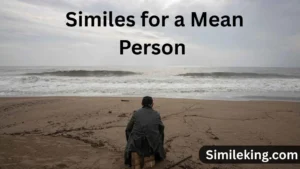The word “broken” can describe physical objects, emotional states, relationships, or abstract ideas. Using similes to express “broken” allows writers and speakers to communicate complex feelings and conditions vividly and creatively. Similes compare one thing to another using “like” or “as,” creating clear and memorable images.
This article explores 10+ similes for broken that range from gentle and polite to intense and casual, helping you find the right tone and expression for any situation. We also discuss how to choose the best simile depending on your audience and context. Finally, you’ll find 5 user-friendly texting examples optimized for clear communication.
Why Use Similes for “Broken”?
Similes add depth and color to language. Instead of bluntly saying something is broken, a simile can evoke emotion, imagery, and nuance. For example, saying “Her heart was like shattered glass” paints a more vivid picture than simply “Her heart was broken.”
By choosing appropriate similes, you can tailor your message to be:
- Polite or gentle, especially when addressing sensitive topics.
- Professional, such as in writing or presentations.
- Casual or conversational for everyday communication.
10+ Similes for Broken with Context and Tone
1. Like Shattered Glass
Tone: Intense, vivid
Use: Emotional or physical destruction
Example: “After the loss, his dreams lay like shattered glass on the floor.”
Nuance: This simile highlights fragility and irreparable damage, best for serious or emotional contexts.
2. Like a Cracked Mirror
Tone: Reflective, metaphorical
Use: Emotional fragmentation or distorted self-image
Example: “She felt like a cracked mirror, unable to see herself clearly.”
Nuance: Suggests not just brokenness but also distortion and confusion.
3. Like a Broken Clock
Tone: Casual, ironic
Use: Something unreliable or stuck
Example: “His explanation was like a broken clock—never on time and often off the mark.”
Nuance: Implies dysfunction but in a light or sarcastic way.
4. Like a Torn Paper
Tone: Gentle, literal or figurative
Use: Damage with possibility of repair
Example: “Their friendship was like torn paper, fragile but still capable of being mended.”
Nuance: Indicates damage but with hope or potential for healing.
5. Like a Rusted Machine
Tone: Professional, descriptive
Use: Neglect or breakdown over time
Example: “The old engine was like a rusted machine, barely functional after years of disuse.”
Nuance: Conveys wear and gradual loss of function.
6. Like a Deflated Balloon
Tone: Casual, emotional
Use: Loss of energy, enthusiasm, or spirit
Example: “After the bad news, she was like a deflated balloon, drained of all joy.”
Nuance: Evokes sadness or exhaustion in an accessible way.
7. Like a Crumbling Wall
Tone: Serious, structural
Use: Breakdown of support or stability
Example: “The team’s morale was like a crumbling wall, ready to collapse under pressure.”
Nuance: Indicates weakening strength or foundation.
8. Like a Fractured Vase
Tone: Poetic, delicate
Use: Something precious damaged
Example: “Their relationship was like a fractured vase, beautiful but broken beyond simple repair.”
Nuance: Suggests beauty and value despite brokenness.
9. Like a Collapsed Bridge
Tone: Dramatic, impactful
Use: Breakdown of connection or communication
Example: “Communication between them was like a collapsed bridge, severed and impossible to cross.”
Nuance: Conveys total disconnection.
10. Like a Snapped Twig
Tone: Natural, subtle
Use: Sudden, small break
Example: “Her resolve was like a snapped twig, breaking under pressure.”
Nuance: Suggests fragility and sudden failure.
Bonus: Like a Cracked Eggshell
Tone: Fragile, vulnerable
Use: Emotional or physical fragility
Example: “He felt like a cracked eggshell, fragile and easily broken.”
Nuance: Emphasizes vulnerability.
How to Choose the Best Simile for “Broken”
Choosing the right simile depends on:
- Audience: Professional writing calls for more neutral or polished similes (e.g., “like a rusted machine”), while casual conversation allows for playful or emotional expressions (e.g., “like a deflated balloon”).
- Context: Emotional states often pair well with metaphors involving fragile objects (glass, eggshell), while structural failures or relationships suit things like “collapsed bridge” or “crumbling wall.”
- Tone: Politeness may require softer or hopeful similes (“like torn paper”), while strong emotional impact suits sharper images (“like shattered glass”).
5 User-Friendly Texting Examples for “Broken”
- Casual Text:
“Hey, I know things feel like shattered glass right now, but I’m here if you want to talk.” - Professional Text:
“The project’s progress is like a rusted machine — we need to address some issues before moving forward.” - Polite/Supportive Text:
“I understand your heart feels like a cracked mirror—take your time to heal.” - Friendly Text:
“Don’t let your confidence be like a deflated balloon. You’ve got this!” - Lighthearted Text:
“My phone’s screen is like a broken clock — it’s always acting up at the worst time!”
Conclusion
Using similes to describe something as “broken” enriches your language and helps convey the exact feeling or situation with more precision and emotion. From the delicate image of a cracked eggshell to the dramatic collapsed bridge, these expressions serve different tones and contexts. Whether you want to sound professional, polite, or casual, there’s a simile for broken that fits your needs.
Keep these similes in mind to express yourself more vividly and choose the right tone for your audience. The texting examples show how easy it can be to incorporate these similes in everyday communication, making your words memorable and impactful.





